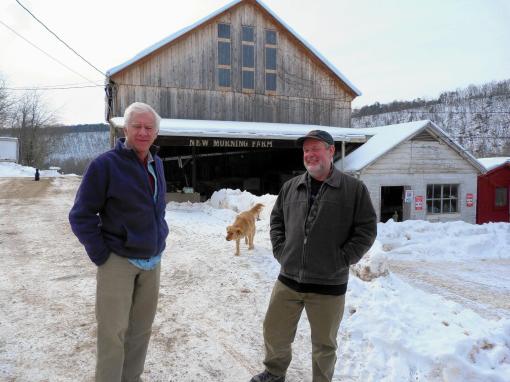HUSTONTOWN, Pa. — Jim Crawford was rushing to load crates of freshly picked organic tomatoes onto trucks heading for an urban farmers market when he noticed the federal agent.
A tense conversation followed as the visitor to his farm — an inspector from the Food and Drug Administration — warned him that some organic-growing techniques he had honed over four decades could soon be outlawed.
“This is my badge. These are the fines. This is what is hanging over your head, and we want you to know that,” Crawford says the official told him.
Crawford’s popular farm may seem a curious place for the FDA to move ahead with a long-planned federal assault on deadly food poisoning. To Crawford’s knowledge, none of the kohlrabi, fennel, sugar snap peas or other crops from his New Morning Farm have ever sickened anyone. But he is not the only organic grower to suddenly discover federal inspectors on his land.
In 2010, after a years-long campaign, food-safety activists persuaded Congress to give the FDA authority to regulate farm practices. The next year, an outbreak of food poisoning that killed 33 people who ate tainted cantaloupes put pressure on the FDA to be aggressive.
Now, farmers are discovering that the FDA’s proposed rules would curtail many techniques that are common among organic growers, including spreading house-made fertilizers, tilling cropland with grazing animals, and irrigating from open creeks.
Suddenly, from small family operations nestled in the foothills of Appalachia to the sophisticated organic-grower networks that serve Los Angeles and San Francisco, the farms that celebrity chefs and food-conscious consumers jostle to buy from are facing an unexpected adversary.
They’re fighting back. Even though full enforcement of the rules is still years away, they are warning customers that some farms would have to close.
“They are going to drive farms out of business,” said Dave Runsten, policy director for Community Alliance with Family Farmers in Davis, Calif.
“The consumer groups behind this don’t understand farming,” Runsten says. “They talk out of both sides of their mouth. They demand these one-size-fits-all regulations, then say, ‘I don’t want to hurt those cute little farmers at the farmers market. I shop at the farmers market.’ It is frustrating.”
Many farmers who take part in the locally grown food movement argue that contamination is a problem of industrial-sized farms and that some of the practices the FDA might ban actually make consumers safer.
Food safety advocates have urged regulators to hang tough. “We don’t believe large facilities are the only place where outbreaks are happening,” said Caroline Smith DeWaal, food safety director at the Center for Science in the Public Interest in Washington. Farm-to-fork growers, she said, need to accept that emerging strains of E. coli and other bacteria can just as easily seep into the produce sold at a farmers market as into the batches of salad bagged at giant processing plants, and they need to tweak their methods to protect against it.

Leave a comment